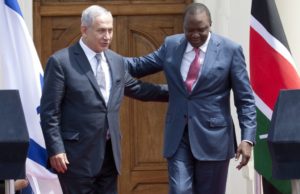by WorldTribune Staff, July 13, 2016
Prime Minister Benjamin Netanyahu has led “the most right-wing government in Israeli history” to a trio of stunning diplomatic successes.
Analysts say Netanyahu continues to prove the conventional wisdom wrong after his “triumphant” tour of Africa, warming of relations and increased security cooperation with Egypt and the restoration of full ties with Turkey.

Netanyahu’s triumphs come as Israel’s enemies continue to pressure others, using oil as leverage to push the boycott Israel movement, analysts say.
“The last time there was a movement on the rise to isolate Israel. in the wake of the 1973 Yom Kippur War, Israel countered by quietly reinforcing ties in Africa,” said Jonathan Schanzer, a vice president at the Foundation for Defense of Democracies, a think tank with a focus on the Middle East.
“The ties, established in the 1950s and 1960s, already were a point of pride for Israel, identifying the Jewish state not as a colonial anomaly, as the Arab nations would have it, but as a post-colonial triumph of an indigenous people. That very much was the point of Netanyahu’s four-nation African tour,” said Schanzer.
“One gets the sense we’re revisiting history amid the new boycott movement – and it’s yielding dividends,” he said.
The tour coincided with the 40th anniversary of an Israeli commando raid on Entebbe in Uganda, where terrorists were holding Israeli airplane passengers with the sanction of the country’s then dictator, Idi Amin. Netanyahu’s elder brother, Yoni, was killed leading the rescue effort.
But the tour was more than symbolic, participants said. Netanyahu traveled with 80 men and women representing some 50 businesses, and was well prepared to assist them, according to Yosef Abramowitz, CEO of Energiya Global Capital, a Jerusalem-based solar energy and social development enterprise.
Abramowitz said he shook hands on $1 billion worth of deals during the four-nation tour.
“A fully coordinated government initiative brilliantly executed in every country by the Prime Minister’s Office, the embassies and the Israel Export Institute, it was clockwork,” he said.
Meanwhile, the terror threat in the Sinai Peninsula poses a shared challenge to Israel and Egypt, and has helped solidify ties between the nations. Israel was one of the few countries to celebrate the 2013 coup that removed the Muslim Brotherhood-led government and brought to power Egyptian President Abdul Fatah Sissi.
“You have a closely coordinated counterterrorism strategy in the Sinai,” Schanzer said. “You have intelligence sharing, increased numbers of Israelis are operating in the Sinai.”
Sissi recently sent his foreign minister, Sameh Shoukry, to Israel for a high-profile visit – effectively warming up a peace that Sissi’s predecessors preferred to keep cool, Schanzer said. “Keeping the Sinai secure trumped the domestic blowback Sissi knew he would endure for the visit.”
Netanyahu also favors direct talks with the Palestinians and, during his visit to Israel Shoukry appeared to favor the direct talks track, saying his visit was part of Sissi’s “vision for establishing peace between the Israeli and Palestinian peoples – bringing this long conflict to an end.”
Bringing Egypt into the fold increases pressure on Palestinian Authority (PA) leader Mahmoud Abbas to return to direct talks, said David Makovsky, a fellow at the Washington Institute for Near East Policy. Egypt is the PA’s lead patron in the Arab world, and Abbas can ill afford to alienate Sissi.
“While the PA president has had no problem rejecting Netanyahu’s call to resume talks amid disbelief that anything concrete will emerge from them, bringing Egypt into the picture raises the cost of any such rejection,” Makovsky wrote on the think tank’s website.
For Turkish President Recep Tayyip Erdogan, re-establishing ties with Israel not only returns an important trade partner to but restores full security ties at a time of crisis and addresses a longstanding U.S. demand that its two most important allies in the Middle East reconcile.
“Erdogan is starting to realize he’s overstretched; Turkey is dealing with so many problems at once,” said Ilan Goldenberg, the director of the Middle East Security Program at the Center for a New American Security think tank. “Erdogan is realizing he has to pull back.”
